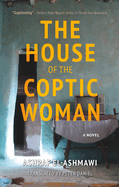
Egyptian author and judge Ashraf El-Ashmawi (The Lady of Zamalek) reunites with Egypt-based translator Peter Daniel for The House of the Coptic Woman, another intricate legal drama. Two disparate narrators--a public prosecutor and a brutalized runaway woman--take turns relating the events in Upper Egypt, where religion-driven politics engender antagonism and violence. Nader Fayez Kamal leaves Cairo for remote Tayea, where he's been posted to the Ministry of Justice "with no advanced warning." He's greeted at his lodging by enigmatic caretaker Ramses, who acts as Nader's unofficial guide to interfacing with the majority Coptic and aggressive Muslim inhabitants. Nader is not the only stranger here; Hoda Yusef Habib seeks refuge in Tayea, fleeing her savage husband whom she left in a pool of blood, defending herself from his latest vicious attack. Hoda's survival is defined by acts of desperate resilience: as a child, her stepfather raped her; her mother discarded her; and even now, she narrowly escapes being drugged and assaulted when she begs for shelter at a mosque. Nader and Hoda's trajectories intersect, setting in motion inflammatory tragedy.
References to the 21st century and Hosni Mubarak mark El-Ashmawi's fiction as contemporary, but the legacy of the former autocratic president whose term ended in 2011 also underscores an ineffectual legal system and extreme gender inequity. Still a youthful idealist, Nader staunchly believes--at first--that he can and will enforce laws and enact justice; that he carries a gun without bullets seems to emphasize his impotent reality. Among the many he can't protect is Hoda. El-Ashmawi's fiction proves to be a sobering exposé of the multilayered abuses of ominous power. --Terry Hong, BookDragon

